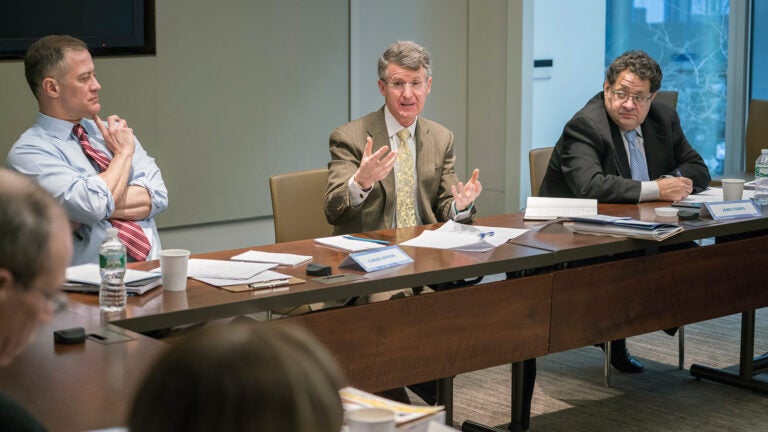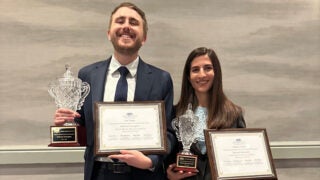
Elwood Hopkins, managing director of Emerging Markets Inc., Kresge Foundation CEO Rip Rapson and CPPP Director James Ferris, from left, lead roundtable discussions in New York. (Photo/Simon Luethi)
The next approach to urban policy and practice across the U.S.
Taking lessons learned from Detroit, USC Price looks into problem-solving on a path to retrenchment and austerity
Few cities have been hit as hard by a confluence of major economic, social, fiscal and political headwinds as Detroit. From long-term economic decline to social unrest, Detroit was already impacted by a series of challenges when the nationwide economic downturn began in 2007.
In the nine years that have elapsed since then, a period that included Detroit’s bankruptcy declaration in 2013, civic leaders have stepped up in new ways as the traditional boundaries between the public, private and philanthropic sectors are being reconfigured and recalibrated in an era of federal retrenchment and state and municipal austerity.
The Center on Philanthropy and Public Policy at the USC Price School of Public Policy, in partnership with the Kresge Foundation, is undertaking an inquiry that chronicles lessons learned from Detroit and possible approaches that may drive the next-generation approach of urban policy and practice in cities across the country.
Smart choices
A fundamental premise of this study is that Detroit is emblematic of other American cities. While the particular circumstances in Detroit may seem exceptional, they differ from those of other urban areas only in degree. How problems are tackled in Detroit may be helpful as a starting point for a broader discussion of urban practice and policy across the country. These new approaches do not necessarily reject conventional practice. While some may be innovative, many are simply smart and creative.
“One of the things we tried to do in Detroit was to apply a ‘torque’ to conventional practice: pivoting around entrenched assumptions or viewing problems from a slightly different angle,” said Rip Rapson, president and CEO of the Kresge Foundation.
The work resulted in problem-solving pathways that shifted traditional boundaries, created a new definition of new civic roles and ultimately framed a different narrative about how positive change can take place in American cities.
CPPP Director James Ferris is leading the research project with Elwood Hopkins, managing director of Emerging Markets Inc.
Philanthropy can play a catalytic role on some really tough problems when it wants.
James Ferris
“Philanthropy can play a catalytic role on some really tough problems when it wants,” Ferris said. “They have really been doing that in Detroit, placing big bets on the city’s ultimate resurgence.”
Drawing on Detroit
The center is hosting five roundtable discussions about the leadership needed and the smart and creative approaches for revitalizing cities, such as the role of the arts in placemaking, entrepreneurial strategies for economic growth and community led urban planning, that will lead to a national forum: Drawing on Detroit: Bold Leadership and the Future of American Cities, scheduled for May 4-5 in Los Angeles.
The forum will bring together prominent thought leaders from Detroit and other cities to examine how philanthropy can help to ignite partnerships and investments that span sectors, what enabling conditions are necessary to stabilize cities, how to build economic momentum in turnaround cities and how new models of cross-sector leadership can help to transform cities.
“This project provides a real opportunity for leaders from different fields, different sectors and different cities to really learn from the Detroit experience,” Hopkins said. “But it’s not a one-way street. Other cities like Memphis, New Orleans, Newark and elsewhere are sharing what they’ve been up to and reacting to the different approaches in Detroit.”
Following the forum, a series of city-to-city exchanges will be facilitated to help identify cities with shared interests for cross-city learning around particular ideas and strategies for urban revitalization.
The inquiry is guided by a distinguished advisory committee that includes, among others: Henry Cisneros, founder and chairman of CityView and former Secretary of the U.S. Department of Housing and Urban Development; Bruce Katz, vice president and founding director of the Metropolitan Policy Program at the Brookings Institution; Julia Stasch, president of the John D. and Catherine T. MacArthur Foundation; and Darren Walker, president and CEO of the Ford Foundation.



